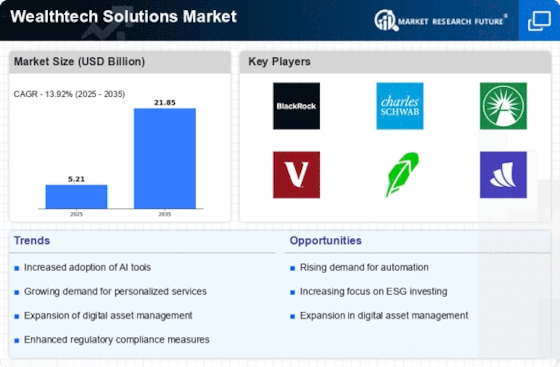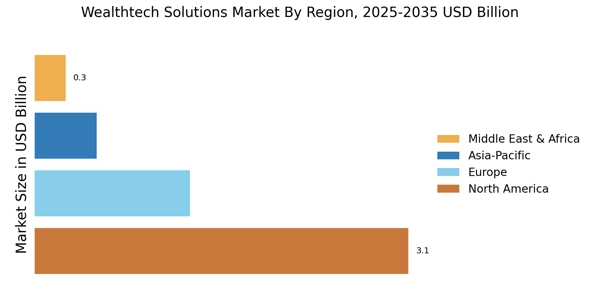Emergence of Robo-Advisors
The Wealthtech Solutions Market is witnessing the emergence of robo-advisors, which are automated platforms that provide financial planning services with minimal human intervention. These services typically utilize algorithms to assess an individual's financial situation and recommend investment strategies tailored to their needs. As of 2025, the adoption of robo-advisors has increased significantly, with estimates indicating that they manage trillions in assets worldwide. This trend reflects a broader shift towards automation in financial services, appealing particularly to younger, tech-savvy investors who prefer low-cost, efficient solutions. The rise of robo-advisors is likely to continue influencing the Wealthtech Solutions Market, as they democratize access to investment management services.
Adoption of Blockchain Technology
The Wealthtech Solutions Market is increasingly adopting blockchain technology, which offers enhanced security and transparency in financial transactions. This technology enables the creation of decentralized financial systems, allowing for peer-to-peer transactions without the need for intermediaries. As of 2025, several Wealthtech firms are integrating blockchain into their platforms to streamline operations and reduce costs associated with traditional financial services. The potential for blockchain to facilitate faster and more secure transactions is likely to attract a broader audience to Wealthtech solutions. Moreover, the transparency provided by blockchain could enhance consumer trust, which is crucial for the growth of the Wealthtech Solutions Market.
Rise of Digital Investment Platforms
The Wealthtech Solutions Market is experiencing a notable rise in digital investment platforms, which provide users with easy access to investment opportunities. These platforms often utilize advanced algorithms to offer personalized investment strategies, catering to individual risk appetites and financial goals. As of 2025, the number of users engaging with these platforms has surged, with estimates suggesting that over 50 million individuals are now utilizing such services. This trend indicates a shift towards self-directed investing, where consumers prefer to manage their portfolios with minimal human intervention. The convenience and accessibility of these platforms are likely to drive further growth in the Wealthtech Solutions Market, as more individuals seek to take control of their financial futures.
Regulatory Innovations and Adaptations
The Wealthtech Solutions Market is navigating a landscape of evolving regulatory frameworks that aim to enhance consumer protection while fostering innovation. As regulators adapt to the rapid advancements in technology, Wealthtech firms are required to comply with new regulations that govern data privacy, cybersecurity, and financial transactions. This dynamic environment presents both challenges and opportunities for Wealthtech companies. Firms that proactively adapt to these regulatory changes may gain a competitive edge, as compliance can enhance consumer trust and attract more users. The ongoing evolution of regulations is likely to shape the strategies of Wealthtech firms, influencing their growth trajectories within the Wealthtech Solutions Market.
Increased Demand for Financial Literacy
The Wealthtech Solutions Market is witnessing an increased demand for financial literacy among consumers. As individuals become more aware of the importance of financial planning and investment, there is a growing need for educational resources and tools that can enhance their understanding of complex financial products. This trend is reflected in the rising number of online courses and webinars aimed at educating consumers about investment strategies, risk management, and wealth accumulation. Furthermore, financial literacy initiatives are being integrated into Wealthtech solutions, enabling users to make informed decisions. The emphasis on education is likely to foster a more knowledgeable consumer base, which could positively impact the Wealthtech Solutions Market by encouraging more individuals to engage with investment platforms.


















